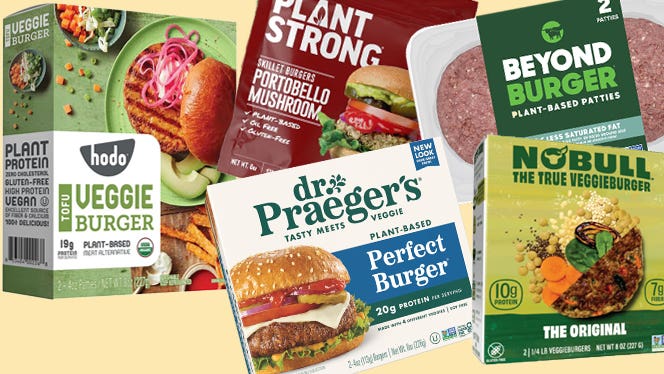
Looking for a Healthy Store-Bought Veggie Burger? A Dietitian Reviews 7 Brands
By Cynthia Sass, MPH, MA, RDN, CSSD,
Last Updated:- A plant-based dietitian reviews seven popular store-bought veggie burger brands, comparing nutrition, ingredients, and overall healthfulness.
- She emphasizes that whole-food, minimally processed patties are best. Read on for her full review, serving tips, and what to look for on the labels.
I always recommend whole plant foods over store-bought meat substitutes. Yet, “Which premade veggie burger is best?” remains one of the top questions I’m asked as a plant-based registered dietitian. I get it. Veggie burgers are convenient. But their ingredients and nutritional composition vary considerably. In addition, brands sometimes reformulate and change up a patty’s ingredients, which makes label-reading a must every time you shop. A homemade version is truly the best way to customize a burger to your dietary needs, preferences, and ingredient standards. But, if you’re looking for a backup or two to keep on hand, here’s my take on seven 100% plant-based store-bought patties and healthful ways to serve them up. Each burger’s oil status is included first, so if that’s a dealbreaker you can simply skip over it. Bon appétit!
No Bull
Oil: No
Pros: This burger scores points for its oil-free status and whole-food, plant-based ingredients such as organic green lentils, organic brown rice and quinoa, veggies, and chickpea flour. Of all the burgers in this roundup it’s the lowest in fat, with just 2 grams total fat (0 grams saturated) per patty. One patty provides 7 grams of dietary fiber—a quarter of the recommended daily target—as well as 10 grams of protein. It’s also gluten-free, featuring wheat-free tamari.
Cons: The tamari makes it a no-go for those with a soy allergy or sensitivity.
Serving idea: Top with mashed avocado and serve in a lettuce wrap with a generous side of vinegar-based slaw. Pair the burger with a cup of hearty black bean soup.
Abbot’s Classic Smokehouse
Oil: Yes, avocado oil
Pros: This gluten-free patty is made from pea protein and a recognizable list of plants, including veggies, oats, sunflower and chia seeds, herbs, and spices. It provides 4 grams of fiber (15% of the daily value) and 22 grams of protein. It’s also soy-free, making it a good option for those with soy allergies or sensitivities.
Cons: Avocado oil contributes to the burger’s 7 grams of fat (including 1 gram of saturated fat). It’s the highest in sodium on this list, with each patty packing 460 milligrams—one-fifth of the recommended daily max for healthy adults.
Serving idea: Try it open faced on a slice of toasted whole grain bread drizzled with vegan pesto and piled high with roasted veggies.
Hodo Tofu Veggie Burger
Oil: Yes, soybean oil
Pros: Tofu lovers will likely enjoy this burger’s texture and flavor, as organic tofu is the star ingredient, in addition to veggies, garlic, and white pepper. It offers 9 grams of dietary fiber per serving and is protein-packed, as well. Bonus: A 4-ounce patty provides 25% of the Daily Value for calcium and 15% for iron.
Cons: The Hodo Tofu Veggie Burger is not an option if you can’t consume soy or if you avoid soybean oil. It’s also relatively high in fat, with 9 grams of fat per serving (32% of calories from fat). At 400 milligrams, the sodium content isn’t off the charts, but it’s worth noting if you follow a lower sodium diet.
Serving idea: Try a banh mi–inspired take: Serve between whole wheat baguette slices spread with jalapeño hummus, along with pickled veggies, sliced cucumber, and fresh cilantro.
Dr. Praeger’s Perfect Burger
Oil: Yes, expeller-pressed canola oil and/or sunflower oil
Pros: This burger is Certified Vegan, Certified Gluten Free, and Non-GMO Project Verified. If meatless meatiness is your thing, this patty delivers. It provides 20 grams of protein and 30% of the Daily Value for iron.
Cons: One patty provides nearly a tablespoon worth of oil, along with 410 milligrams of sodium. And it’s made with methyl cellulose (as less than 2% of the ingredients), an additive often used to enhance a veggie burger’s texture. Methyl cellulose, which is originally sourced from fibrous plant material, is considered to have low toxicity for humans by the European Food Safety Authority and the Environmental Working Group hasn’t identified concerns regarding its use in food—but it is a commercially produced ingredient that requires steps you can’t reproduce in your own kitchen.
Serving idea: Cook it in an air fryer to sidestep additional oil. Dress it with oil-free BBQ sauce, and top with fresh veggies like lettuce, onion, tomato, and sprouts. Serve on a whole grain sprouted English muffin.
Plant Strong Portobello Mushroom Skillet Burger
Oil: No
Pros: Simply made from oats, sunflower seeds, quinoa flakes, chia seeds, veggies, herbs, and spices (with some organic ingredients), this product is Certified Vegan and Non-GMO Project Verified. One serving provides just 190 milligrams of sodium (the lowest on this list), along with 5 grams of fiber. And all 7 grams of fat (including 0.5 gram of saturated fat) come from whole plants.
Cons: Rather than preformed patties, this just-add-water mix requires a few extra steps before cooking.
Serving idea: Serve open-faced on buckwheat toast spread with spicy brown mustard, and top with tangy raw sauerkraut. Pair with a side of herbed lentils.
Actual Veggies Mushroom Quinoa Burger
Oil: Yes, avocado oil
Pros: The newest version of this brand’s Mushroom Quinoa burger provides 6 grams of fiber per patty, 18 grams of plant protein, and 4 grams of fat (0.5 grams as saturated fat), in addition to 50% of the Daily Value for potassium, 60% for vitamin A, 20% for iron, and 15% for magnesium, vitamin K, and selenium. Ingredients include white button mushrooms, oat, pea protein, white quinoa, chickpea flour, veggies, herbs, and spices. The sodium content is moderate at 330 milligrams, less than 15% of the recommended daily limit.
Cons: If you’re oil-free, you’ll need to pass on this one, and it’s important to note that not all of this brand’s burgers are vegan (some contain cheese), so be sure to check ingredient lists.
Serving idea: Since the patty contains whole grains, serve between roasted red bell pepper halves, along with herbed tahini and a side of sautéed kale.
Beyond Burger
Oil: Yes, avocado oil
Pros: In the newest version of this widely available burger, the primary ingredient (after water) is yellow pea protein. One patty packs 21 grams of protein, with 8% of the Daily Value for both calcium and potassium, and it’s moderate in sodium at 310 milligrams. The burgers are Non-GMO Project Verified and Clean Label Project Certified. Part of Beyond’s mission is to build meat from plants and “deliver the meaty experience you crave.” If you’re looking for the plant burger that most closely resembles meat, this is it.
Cons: Each burger contains 14 grams of fat, the highest on the list, and Beyond Burgers feature the additive methyl cellulose (albeit this accounts for less than 2% of the ingredient makeup).
Serving idea: Opt for a whole grain bun with traditional toppings, such as no-sugar-added ketchup, mustard, lettuce, tomato, onion, and pickles, or serve in a lettuce wrap with a side of roasted fingerling potatoes. Round out your meal with bonus veggies, like oven-roasted broccoli.
Plant-Based Burgers by the Numbers
| No Bull | Abbot’s | Hodo | Dr. Praeger’s | Plant Strong | Actual Veggies | Beyond | |
| Oil | Oil-free | Avocado oil | Soybean oil | Expeller pressed canola oil and/or sunflower oil | Oil-free | Avocado oil | Avocado oil |
| Calories | 180 | 200 | 200 | 220 | 170 (lowest) | 180 | 230 (highest) |
| Fiber | 7 g | 4 g | 9 g (highest) | 3 g | 5 g | 6 g | 2 g (lowest) |
| Protein | 10 g | 22 g (highest) | 19 g | 20 g | 7 g (lowest) | 18 g | 21 g |
| Fat | 2 g (lowest) | 7 g | 9 g | 12 g | 7 g | 4 g | 14 g (highest) |
| Saturated Fat | 0 g (lowest) | 1 g | 0.5 g | 1 g | 0.5 g | 0.5 g | 2 g (highest) |
| Carbs | 32 g (highest) | 15 g | 11 g | 9 g | 24 g | 21 g | 8 g (lowest) |
| Sodium | 340 mg | 460 mg (highest) | 400 mg | 410 mg | 190 mg (lowest) | 330 mg | 310 mg |

About the Author

About the Author
Cynthia Sass, MPH, MA, RDN, CSSD
Join our mailing list
Get free recipes and the latest info on living a happy, healthy plant-based lifestyle.
By providing your email address, you consent to receive newsletter emails from Forks Over Knives. We value your privacy and will keep your email address safe. You may unsubscribe from our emails at any time.